Austrian-Hungarian actress Margit Symo (1913-1992) danced and sang in many German entertainment films of the Nazi era. She often appeared as a gypsy in her films. In 1974 she returned to the screen under the direction of Rainer Werner Fassbinder.
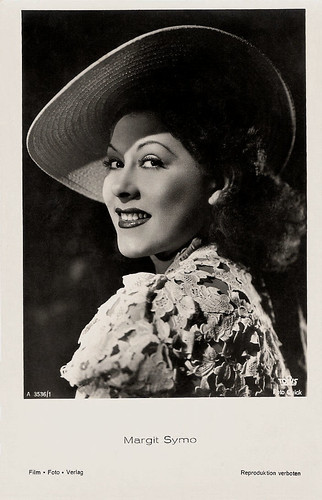
German postcard by Film-Foto-Verlag, no. 3536/1, 1941-1944. Photo: Quick / Tobis.
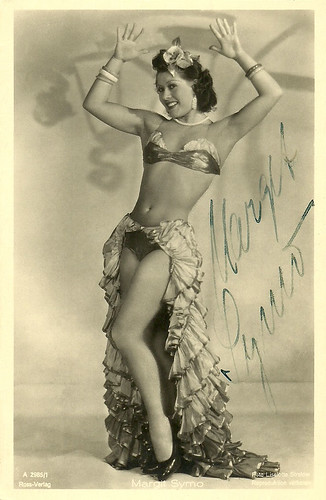
German postcard by Ross Verlag, no. A 2985/1, 1939-1940. Photo: Liselotte Strelow. Collection: Didier Hanson.
Gypsy Blood
Margit Symo was born in Budapest, Austria-Hungary (now Hungary), in 1913. After some stage engagements in her home country Hungary as a dancer she moved to Germany. There she made her first film appearance in the German operetta adaptation Zigeunerblut/Gypsy Blood (1934, Charles Klein) with Adele Sandrock. On stage she appeared in many revues, often with her brother Michael Symo as her dancing partner. In the following years she played supporting parts for several German entertainment films, like Eine Nacht an der Donau/A Night on the Danube (1935, Carl Boese) and Der Unwiderstehliche/The Irresistible Man (1937, Géza von Bolváry), in which she often danced and sometimes sang. In Spain she appeared in the Spanish musical Carmen, la de Triana (1938, Florián Rey) starring Imperio Argentina. Symo was credited as Margarita Simó in this film. During the war years she played next to Heinrich George in Der Postmeister/The Stationmaster (1940, Gustav Ucicky), with Hans Moser in Einmal der liebe Herrgott sein/To Be God Just Once (1942, Hans H. Zerlett), and with Emil Jannings in Altes Herz wird wieder jung/An Old Heart Becomes Young Again (1943, Erich Engel). Those roles were supporting parts, but sometimes she played the leading lady like in the crime comedy Die Sache mit Styx/The Affairs of Styx (1942, Karl Anton) opposite Viktor de Kowa.
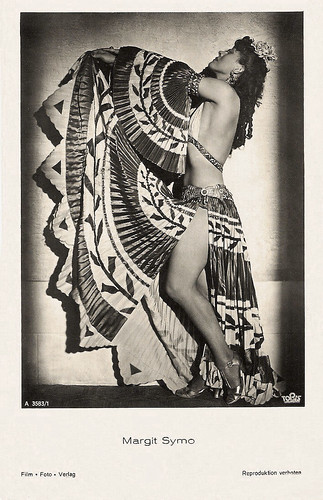
German postcard by Film-Foto-Verlag, no. A 3583/1, 1941-1944. Photo: Tobis. Margit Symo in Die Sache mit Styx/The Affairs of Styx (Karl Anton, 1942).
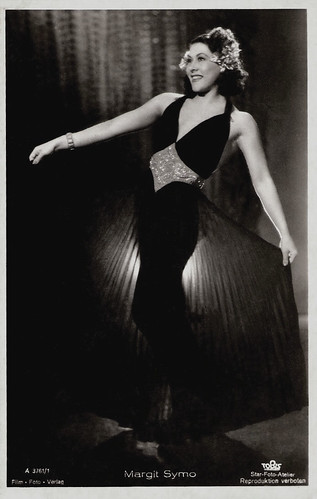
German postcard by Film-Foto-Verlag, no. 3761/1, 1941-1944. Photo: Star Foto-Atelier/Tobis.
Compromising Letters
During the Second World War, Margit Symo followed her husband, composer, and symphony director Willy Mattes, to Sweden. He was engaged to become the orchestra director of Sveriges Radio in Stockholm. When they returned to Germany in 1951 Margit Symo was able to gain a foothold in the film business again. She played small parts in film comedies like Die kleine Stadt will schlafen gehen/Little Town Will Go To Sleep (1954, Hans H. König), Ich denke oft an Piroschka/I Often Think of Piroschka (1955, Kurt Hofmann) with Liselotte Pulver, and Der tolle Bomberg/The Mad Bomberg (1957, Rolf Thiele) with Hans Albers. Hal Erickson at AllMovie about Die kleine Stadt will schlafen gehen/Little Town Will Go To Sleep (1954: "The town in question is a 'respectable' German community, thrown into an uproar when a mailbag is stolen. It seems that the bag contained several compromising letters, which, if discovered, will result in a lot of trouble for a lot of local citizens. Somehow or other, the populace comes to the conclusion that the town's "black sheep," a hedonistic sculptor, is in possession of the letters, and that's where the fun begins. The fact that the film manages to squeeze in a bit of nudity enhanced its salability in America." In the 1960s Symo's fame faded.
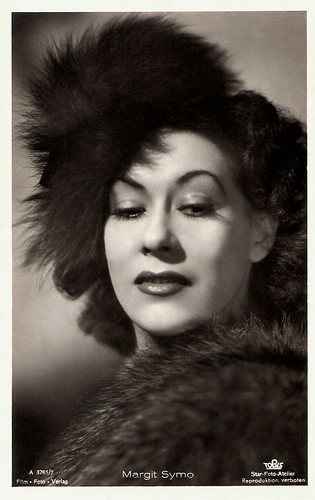
German postcard by Film-Foto-Verlag, no. 3761/2, 1941-1944. Photo: Star-Foto-Atelier / Tobis.
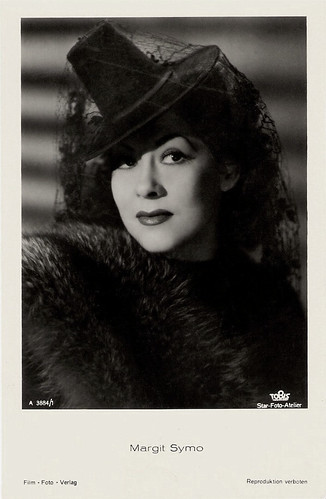
German postcard by Film-Foto-Verlag, no. 3884/1, 1941-1944. Photo: Star Photo-Atelier / Tobis.
Fassbinder
Margit Symo returned to the screen in Rainer Werner Fassbinder’s beautiful social melodrama Angst essen Seele/Ali: Fear Eats the Soul (1974). This film based on Douglas Sirk's All That Heaven Allows tells the story of a lonely German cleaning woman (Brigitte Mira) who falls in love with an equally lonely Moroccan immigrant (El Hedi Ben Salem) 15 years younger than her. As society finally gets used to and accept the unconventional romance, the couple themselves begin to struggle to maintain a grip on the happiness they thought would be their's by right. Brock Silvey writes at IMDb: "Fassbinder directs in a low-key, unfussy style, yet he creates images and scenes that linger in the head long after the film is over. It's a lovely film, very well acted, scripted and directed. It's not exactly sad, because it argues that societies are able eventually to adapt to new things and accept things they originally rejected. But it's not exactly happy either, because it suggests that relationships don't necessarily become easier just because external obstacles are removed." The film won the international critic's prize at the Cannes Film Festival. On television Margit Symo was seen as a guest star in such series as Salto Mortale (1969) and the Krimi Der Kommissar/The Commissioner (1975) with Erik Ode and Fritz Wepper. She also appeared in a few cult films by Fassbinder associates, like Heute spielen wir den Boß/Today We Play the Boss (1981, Peer Raben), Crazy Boys (1987, Peter Kern) and Hab' ich nur deine Liebe/If I Had Just Your Love (1989, Peter Kern). Margit Symo died in 1992 in München (Munich), Germany, at age 79. In 1956 she had divorced Willy Mattes. They had a daughter, actress Eva Mattes (1954), who was the star of several Fassbinder films.
Trailer Der Postmeister/The Stationmaster (1940). Source: Spuller (YouTube).
Trailer of Ich denke oft an Piroschka/I Often Think of Piroschka (1955). Source: Filmkiste (YouTube).
Trailer Angst essen Seele/Ali: Fear Eats the Soul (1974). Source: Tusnyanet (YouTube).
Sources: Thomas Staedeli (Cyranos), Stephanie D’Heil (Steffi-line), Hal Erickson (AllMovie), Brock Silvey (IMDb), Wikipedia (German) and IMDb.

German postcard by Film-Foto-Verlag, no. 3536/1, 1941-1944. Photo: Quick / Tobis.

German postcard by Ross Verlag, no. A 2985/1, 1939-1940. Photo: Liselotte Strelow. Collection: Didier Hanson.
Gypsy Blood
Margit Symo was born in Budapest, Austria-Hungary (now Hungary), in 1913. After some stage engagements in her home country Hungary as a dancer she moved to Germany. There she made her first film appearance in the German operetta adaptation Zigeunerblut/Gypsy Blood (1934, Charles Klein) with Adele Sandrock. On stage she appeared in many revues, often with her brother Michael Symo as her dancing partner. In the following years she played supporting parts for several German entertainment films, like Eine Nacht an der Donau/A Night on the Danube (1935, Carl Boese) and Der Unwiderstehliche/The Irresistible Man (1937, Géza von Bolváry), in which she often danced and sometimes sang. In Spain she appeared in the Spanish musical Carmen, la de Triana (1938, Florián Rey) starring Imperio Argentina. Symo was credited as Margarita Simó in this film. During the war years she played next to Heinrich George in Der Postmeister/The Stationmaster (1940, Gustav Ucicky), with Hans Moser in Einmal der liebe Herrgott sein/To Be God Just Once (1942, Hans H. Zerlett), and with Emil Jannings in Altes Herz wird wieder jung/An Old Heart Becomes Young Again (1943, Erich Engel). Those roles were supporting parts, but sometimes she played the leading lady like in the crime comedy Die Sache mit Styx/The Affairs of Styx (1942, Karl Anton) opposite Viktor de Kowa.

German postcard by Film-Foto-Verlag, no. A 3583/1, 1941-1944. Photo: Tobis. Margit Symo in Die Sache mit Styx/The Affairs of Styx (Karl Anton, 1942).

German postcard by Film-Foto-Verlag, no. 3761/1, 1941-1944. Photo: Star Foto-Atelier/Tobis.
Compromising Letters
During the Second World War, Margit Symo followed her husband, composer, and symphony director Willy Mattes, to Sweden. He was engaged to become the orchestra director of Sveriges Radio in Stockholm. When they returned to Germany in 1951 Margit Symo was able to gain a foothold in the film business again. She played small parts in film comedies like Die kleine Stadt will schlafen gehen/Little Town Will Go To Sleep (1954, Hans H. König), Ich denke oft an Piroschka/I Often Think of Piroschka (1955, Kurt Hofmann) with Liselotte Pulver, and Der tolle Bomberg/The Mad Bomberg (1957, Rolf Thiele) with Hans Albers. Hal Erickson at AllMovie about Die kleine Stadt will schlafen gehen/Little Town Will Go To Sleep (1954: "The town in question is a 'respectable' German community, thrown into an uproar when a mailbag is stolen. It seems that the bag contained several compromising letters, which, if discovered, will result in a lot of trouble for a lot of local citizens. Somehow or other, the populace comes to the conclusion that the town's "black sheep," a hedonistic sculptor, is in possession of the letters, and that's where the fun begins. The fact that the film manages to squeeze in a bit of nudity enhanced its salability in America." In the 1960s Symo's fame faded.

German postcard by Film-Foto-Verlag, no. 3761/2, 1941-1944. Photo: Star-Foto-Atelier / Tobis.

German postcard by Film-Foto-Verlag, no. 3884/1, 1941-1944. Photo: Star Photo-Atelier / Tobis.
Fassbinder
Margit Symo returned to the screen in Rainer Werner Fassbinder’s beautiful social melodrama Angst essen Seele/Ali: Fear Eats the Soul (1974). This film based on Douglas Sirk's All That Heaven Allows tells the story of a lonely German cleaning woman (Brigitte Mira) who falls in love with an equally lonely Moroccan immigrant (El Hedi Ben Salem) 15 years younger than her. As society finally gets used to and accept the unconventional romance, the couple themselves begin to struggle to maintain a grip on the happiness they thought would be their's by right. Brock Silvey writes at IMDb: "Fassbinder directs in a low-key, unfussy style, yet he creates images and scenes that linger in the head long after the film is over. It's a lovely film, very well acted, scripted and directed. It's not exactly sad, because it argues that societies are able eventually to adapt to new things and accept things they originally rejected. But it's not exactly happy either, because it suggests that relationships don't necessarily become easier just because external obstacles are removed." The film won the international critic's prize at the Cannes Film Festival. On television Margit Symo was seen as a guest star in such series as Salto Mortale (1969) and the Krimi Der Kommissar/The Commissioner (1975) with Erik Ode and Fritz Wepper. She also appeared in a few cult films by Fassbinder associates, like Heute spielen wir den Boß/Today We Play the Boss (1981, Peer Raben), Crazy Boys (1987, Peter Kern) and Hab' ich nur deine Liebe/If I Had Just Your Love (1989, Peter Kern). Margit Symo died in 1992 in München (Munich), Germany, at age 79. In 1956 she had divorced Willy Mattes. They had a daughter, actress Eva Mattes (1954), who was the star of several Fassbinder films.
Trailer Der Postmeister/The Stationmaster (1940). Source: Spuller (YouTube).
Trailer of Ich denke oft an Piroschka/I Often Think of Piroschka (1955). Source: Filmkiste (YouTube).
Trailer Angst essen Seele/Ali: Fear Eats the Soul (1974). Source: Tusnyanet (YouTube).
Sources: Thomas Staedeli (Cyranos), Stephanie D’Heil (Steffi-line), Hal Erickson (AllMovie), Brock Silvey (IMDb), Wikipedia (German) and IMDb.
No comments:
Post a Comment